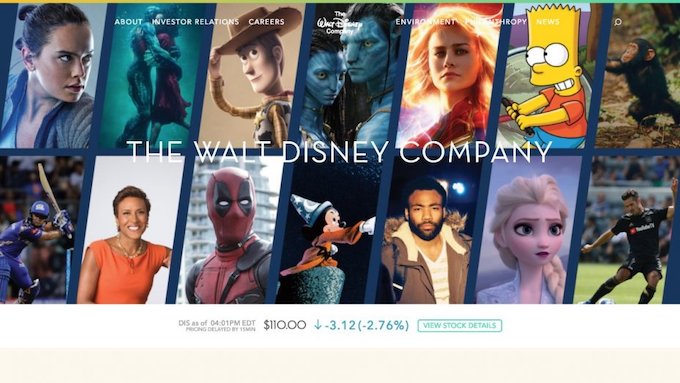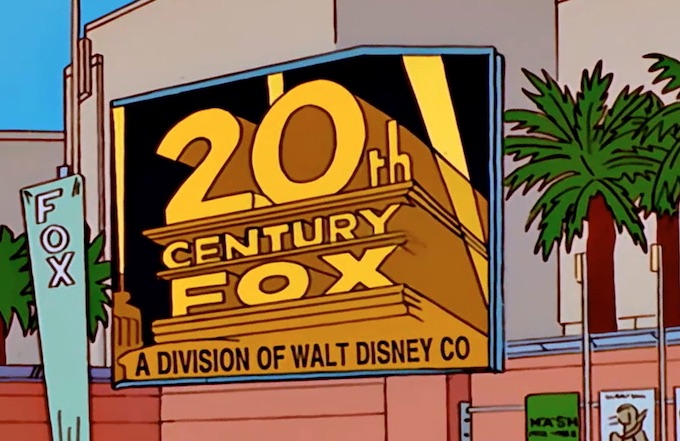On the midnight of March 20 (via The Hollywood Reporter), The Walt Disney Company completed its long-awaited acquisition of 21st Century Fox‘s entertainment assets. This purchase, first proposed in December 2017, ultimately cost Disney a grand total of $71.3 billion.
As part of this purchase, Disney received the entire 20th Century Fox film and television library, as well as Fox 2000 Pictures, Fox Searchlight Pictures, Blue Sky Studios, FX Networks, National Geographic Channel, and Star India. The deal also included Fox’s original 30% stake of the streaming service Hulu, increasing Disney’s ownership to 60%. Comcast and AT&T’s WarnerMedia still own 30% and 10% of Hulu respectively.
This, however, does not mean that Disney owns the entirety of Fox in general. Fox co-chairman Rupert Murdoch and his CEO son Lachlan have slimmed down their remaining assets into the newly-formed Fox Corporation, which includes their news and sports assets, and Fox Broadcasting Company. “The new Fox will begin as the only media company solely focused on the domestic market; focused on what Americans love best — sports, news and entertainment, built and delivered for a U.S. audience,” Rupert Murdoch stated the previous year.
With Fox’s entertainment assets in their hands, Disney’s library is now stronger than ever before. Now they have full ownership of treasured franchises such as Avatar, Die Hard, X-Men (including Deadpool), Planet of the Apes, Alien/Predator, Home Alone, Modern Family, the full rights to Star Wars: A New Hope, and more.
Animation-wise, Disney will be a new home for sitcoms like The Simpsons, Futurama, Family Guy (and it’s spinoff The Cleveland Show), American Dad, Bob’s Burgers, and King of the Hill, as well as animated features like Wizards, Fire and Ice, FernGully: The Last Rainforest (and it’s direct-to-video sequel), The Pagemaster, Anastasia, Bartok the Magnificent, Titan A.E., Digimon: The Movie, Waking Life, Fantastic Mr. Fox, The Book of Life, and Isle of Dogs. Blue Sky Studios and their output are also included in the package, with the Ice Age and Rio films, Robots, Horton Hears a Who!, Epic, The Peanuts Movie, and Ferdinand.
(Please note that this acquisition does not include the DreamWorks Animation films released by 20th Century Fox between 2013 and 2017. Those distribution rights have since been transferred to DreamWorks’ new owner Universal Pictures.)

A major factor for this ambitious buyout is in response to the rapidly-changing media landscape, where online streaming is becoming the dominant consumer format. As Disney CEO Bob Iger noted to staff (also via The Hollywood Reporter), “We are rapidly transforming our company to take full advantage of evolving consumer trends and emerging technology in order to thrive in this new and exciting time.”
The company’s upcoming streaming service Disney+ (and their increased Hulu stake) serves as their response to catch up and battle the likes of Netflix and Amazon. Disney’s newly-acquired Fox assets will help give them a strong start in the streaming race.
While comic fans will indeed celebrate the X-Men and Fantastic Four returning home to Marvel and await their debut in the MCU, the reduction from six major film studios to five does come with consequences. Along with the estimated 4,000-10,000 layoffs of Fox employees, Disney’s near-monopolistic dominance in cinema will likely put further pressure on consumers, theatre chains, and smaller film studios like Sony, Paramount, and Lionsgate.
Former Fox co-chairman and current Sony Pictures chairman Tom Rothman (via Variety) openly criticized the merger as “deeply anti-competitive”, and added that “consumers will ultimately suffer. What I think the loss to consumers is, is a tremendous loss of originality. That’s the greatest threat the movie business faces.”
An even bigger concern for the animation community is regarding Blue Sky Studios, which Disney has been very vague about. It remains a mystery what Disney will do with the Connecticut-based animation studio, especially since it now has to co-exist with Disney Animation, Pixar, and Lucasfilm Animation. The fate of Blue Sky and their upcoming animated movies like Spies in Disguise, Nimona, and Foster will be in the air for now until Disney makes an announcement.

[Disney-Fox]
In regards to the future of post-merger Disney, Iger added the following to his staff notice: “I wish I could tell you that the hardest part is behind us; that closing the deal was the finish line, rather than just the next milestone. What lies ahead is the challenging work of uniting our businesses to create a dynamic, global entertainment company.”
Roxann Dawson’s Breakthrough, releasing on April 17, 2019, is set to hold the distinction as the first Fox movie to be released by Disney. Blue Sky’s Spies in Disguise will be Fox’s first animated feature released under the new ownership, which is still scheduled for September 13, 2019.
Disney and Fox’s current theatrical animated lineup is as follows:
- Toy Story 4 [Disney/Pixar] – June 21, 2019
- The Lion King (2019) [Disney] – July 19, 2019
- Spies in Disguise [Fox/Blue Sky] – September 13, 2019
- Frozen II [Disney] – November 22, 2019
- Nimona [Fox/Blue Sky] – February 14, 2020
- Onward [Disney/Pixar] – March 6, 2020
- Untitled Pixar film [Disney/Pixar] – June 19, 2020
- Untitled Bob’s Burgers film [Fox] – July 17, 2020
- Ron’s Gone Wrong [Fox/Locksmith] – November 6, 2020
- Untitled Disney Animation film [Disney] – November 25, 2020
- Foster [Fox/Blue Sky] – March 5, 2021
- Untitled Pixar film [Disney/Pixar] – June 18, 2021
- Untitled Disney Animation film [Disney] – November 24, 2021
- Untitled Pixar film [Disney/Pixar] – March 18, 2022
- Untitled Pixar film [Disney/Pixar] – June 17, 2022
- Untitled Disney Animation film [Disney] – November 23, 2022






